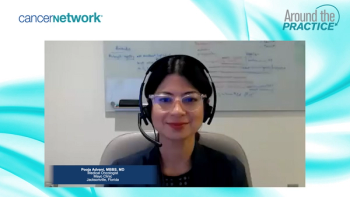
In a virtual discussion hosted by Asher A. Chanan-Khan, MD, MBBS, experts from Mayo Clinic discuss treatment strategies for chronic lymphocytic leukemia, including the role of cardio-oncology and various therapeutic approaches.

Your AI-Trained Oncology Knowledge Connection!


In a virtual discussion hosted by Asher A. Chanan-Khan, MD, MBBS, experts from Mayo Clinic discuss treatment strategies for chronic lymphocytic leukemia, including the role of cardio-oncology and various therapeutic approaches.

Mayo Clinic experts note that targeted therapies for chronic lymphocytic leukemia are generally superior to chemoimmunotherapy, with treatment choices tailored to patient comorbidities and preferences, and noting that real-world data mostly aligns with clinical trials.

Ricardo D. Parrondo, MD, discusses monotherapy and combination BTKi therapy options for chronic lymphocytic leukemia, noting that the decision depends on patient preferences and disease risk.

SEQUOIA trial data show significant benefits in progression-free survival for patients with chronic lymphocytic leukemia treated with single-agent zanubrutinib, even without a high-risk 17P mutation; Pooja Advani, MD, MBBS, notes that second-generation BTK inhibitors show lower rates of atrial fibrillation and flutter compared with first-generation ones, suggesting increased cardiac safety.

Experts highlight that second-generation BTK inhibitors offer improved toxicity profiles, lower cardiovascular risks, and are well tolerated for long-term CLL treatment.

Experts discuss that although first-generation BTK inhibitors such as ibrutinib were groundbreaking for CLL treatment, the field is now shifting toward second-generation options because of their better toxicity profiles. However, the choice between second-generation inhibitors should be personalized, considering individual patient profiles and adverse effects.

Ricardo Parrondo, MD, discusses the potential of combining BTK and BCL2 inhibitors in chronic lymphocytic leukemia treatment, emphasizing their synergistic effect and cautioning against use in frail patients or those with cardiovascular comorbidities, while Pooja Advani, MBBS, MD, stresses the importance of medical history and risk stratification, especially regarding cardiovascular adverse effects.

Key opinion leaders detail strategies for patients with chronic lymphocytic leukemia relapsing after fixed-duration BTK and BCL2 inhibitor treatment, emphasizing the importance of genetic testing for mutations that could render them resistant to a re-challenge and considering third-generation BTK inhibitors if mutations are found.

Experts discuss the management of a patient with chronic lymphocytic leukemia who experienced adverse effects such as joint pain and atrial fibrillation while on treatment with ibrutinib, emphasizing the role of cardio-oncology and considering a switch to a second-generation BTK inhibitor for better safety and fewer drug interactions.

Medical expert discusses that when managing relapsed or refractory chronic lymphocytic leukemia, the goals are similar to first-line therapy, and he emphasizes using BCL-2 and BTK inhibitors, guided by factors such as previous therapies, patient preferences, and comorbidities.

The panel discusses key data from the ALPINE trial comparing ibrutinib and zanubrutinib in relapsed chronic lymphocytic leukemia, showing a progression-free survival favoring zanubrutinib; Ricardo Parrondo, MD, suggests this may be due to its better toxicity profile, leading to longer patient adherence.

Medical expert outlines that resistance to BTK inhibitors in patients with chronic lymphocytic leukemia is commonly mediated by mutations in BTK or phospholipase Cγ2 proteins, and highlights new, unique mutation patterns in zanubrutinib; he also mentions emerging therapies including noncovalent BTK inhibitors and clinical trials focusing on BTK degradation for additional lines of therapy.

Experts discuss that for patients with chronic lymphocytic leukemia intolerant to the BTK inhibitor ibrutinib, due to side effects like arthralgia, myalgia, or diarrhea, switching to a second-generation BTK inhibitor can be effective and better tolerated.

Pooja Advani, MBBS, MD, discusses that switching from ibrutinib to second-generation BTK inhibitors like acalabrutinib leads to fewer off-target side effects like atrial fibrillation while maintaining high disease control.

Asher A. Chanan-Khan, MBBS, MD, led a panel discussion surround the use of Bruton tyrosine kinase inhibitors for patients with chronic lymphocytic leukemia.

Ricardo Parrondo, MD, discusses that in treating chronic lymphocytic leukemia, BTK inhibitors like ibrutinib can pose cardiovascular risks, including hypertension; he suggests that in choosing a BTK inhibitor one should consider the patient's preexisting cardiovascular conditions.

Ricardo Parrondo, MD, explains that different BTK inhibitors have varying rates of cardiovascular side effects in patients with chronic lymphocytic leukemia, suggesting the choice between them should consider a patient's preexisting cardiovascular conditions, with acalabrutinib favored for hypertension concerns and zanubrutinib for atrial fibrillation issues.

Doctors discuss that while cardiovascular side effects like atrial fibrillation and hypertension in patients with chronic lymphocytic leukemia are concerns with BTK inhibitors, they are manageable and should not deter prescribing these effective therapies; generally, atrial fibrillation is considered more challenging to manage than hypertension.

Concluding their discussion, Drs Advani, Parrondo, and Chanan-Khan conclude that second-generation BTK inhibitors are the preferred first-line treatment in patients with chronic lymphocytic leukemia due to better efficacy and lower cardiovascular risk, with emerging therapies promising even better outcomes.